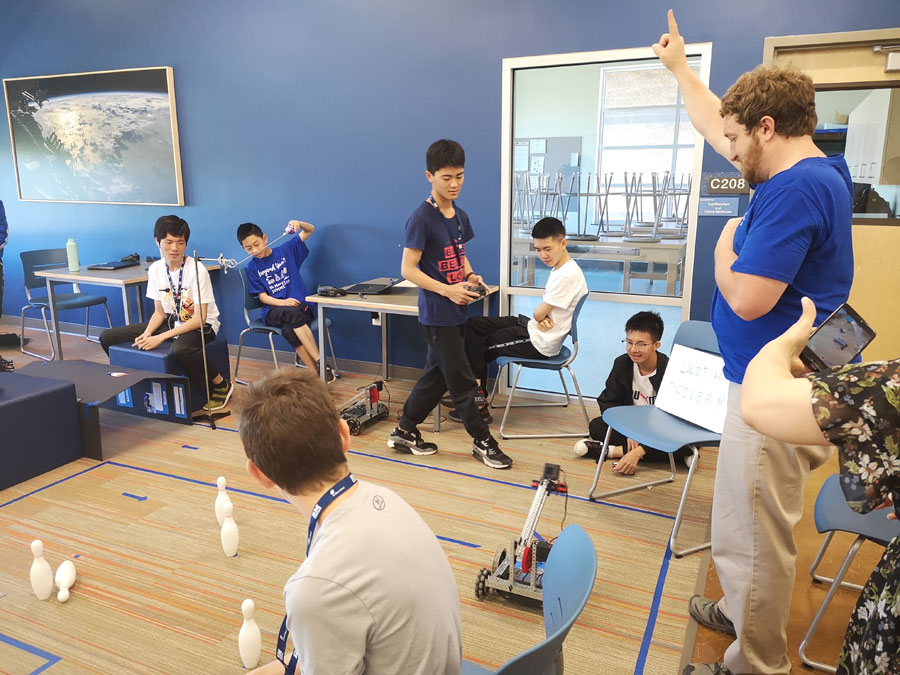
Students from Pinghu Middle School in Zhejiang province attend a summer camp on advanced robotics at St. Mary's School in the US state of Oregon in July. (Photo: China Daily)
Zhou Xiaodong, a deputy general manager of an enterprise in Wuhan, Hubei province, has been thinking about sending his son Zhou Zixuan to an overseas university since he was just a seventh-grade student.
In order to help his son get accustomed to life and studies overseas in advance, Zhou last year enrolled him in a summer camp in the United States, which Zhou said "changed his son greatly".
His son was initially reluctant to study abroad. However, after returning from the summer camp, he told Zhou that he hoped to attend a foreign university in the future.
"He gained a lot of knowledge about the lifestyle of his peers overseas, such as how they play and learn. He made some foreign friends and improved his ability to interact with people," Zhou said.
As Chinese children are heading abroad for studies at a very young age, participating in summer camps overseas before formally starting their studies there has become a common way for Chinese students to get academically or mentally prepared, according to Shao Yuan, marketing director of KnowledgeLink Group Inc, a US-based education and consulting company.
The ongoing summer vacation has so far seen at least 500 Chinese students taking part in summer camps organized by the company overseas. The camps are themed on science, technology, engineering, arts and math, or project-based learning.
"By familiarizing young students with the international study and living environment in advance, summer camps are deemed by many Chinese parents as a good way to gear up their children for overseas study in the future," she said.
Kevin Wang, marketing director of Global Tour Study at New Oriental Education& Technology Group, said such overseas summer camps, usually costing at least 30,000 yuan ($4,250) each trip, have been well-received by some wealthy parents.
Students participating in these programs are mostly aged between 10 and 18.
The younger ones-primary school students-usually choose camps in nearer destinations like Japan and Singapore, while those in middle school who are more linguistically capable and can better take care of themselves, take part in programs in farther countries like the United Kingdom and the US, Wang said.
"Generally speaking, a majority of parents choosing summer camps overseas have a long-term plan, such as study or even emigrating overseas, for their children. They hope the children could improve language proficiency and enrich travel experience by participating in such summer camps," he added.
Shao said by immersing in an authentically exotic environment for one week or up to one month, students are able to get an all-round experience on what overseas study is like. It also helps students identify whether they are suitable for the study.
Earlier this month, Zhang Xin, a resident of Zhengzhou, Henan province, sent her 16-year-old daughter to St. Mary's School, Oregon, US, for a one-week summer camp themed on robotics and programming.
There, together with peers from different countries and backgrounds, Zhang's daughter, Ma Saiyudi, engaged herself in a wide range of courses and activities, including making robots, climbing mountains and hiking through jungles.
Zhang said before setting out for the summer camp, her daughter hadn't been very sure whether to pursue studies abroad in the future because she doubted whether she could well adapt to life and study in a foreign country.
After the weeklong trip, she was quite determined. She loved the teaching approach and the atmosphere there.
"Moreover, with such an experience, an educational institution overseas is no longer a completely new environment for my daughter," Zhang said. "I believe she will get used to her new life faster in the future."
Compared with the longer distance and more expensive travel to a foreign country, many parents, especially of children aged under 10, preferred domestic trips for their children.
These trips, organized mostly by travel agencies or education companies, cover themes such as improving children's artistic or cultural competence, training their physical or mental strengths and so on, according to EF Education First China, a Sweden-based education company.
Kevin Wang from New Oriental said the domestic summer camps seem to be more relaxing, as many parents treat such trips during summer holidays as an opportunity for their overburdened children to have a break at an affordable cost.
"In the eyes of this group of parents, entertainment is of equal importance to learning and an ideal program is one that combines the two and finds balance between the two," he said, adding that summer camps that expose children to history and culture and those engaging children in nature have been particularly popular in recent years.
Yu Xiaotian, a mother of a seventh-grader in Beijing, has been enrolling her son in domestic summer camps almost every summer vacation in the past few years. Through these trips, Yu's son has been to grasslands in North China's Inner Mongolia autonomous region, Erhai Lake in Southwest China's Yunnan province and Baiyangdian in Hebei province.
"During the trips, my son was asked to do some 'mini-research', which I think helped him gain knowledge on and deepen understanding of the places he visited. For kids of his age, such summer camps are more meaningful than just traveling somewhere as a tourist," she said, adding that she's looking for a program for her son this summer.


